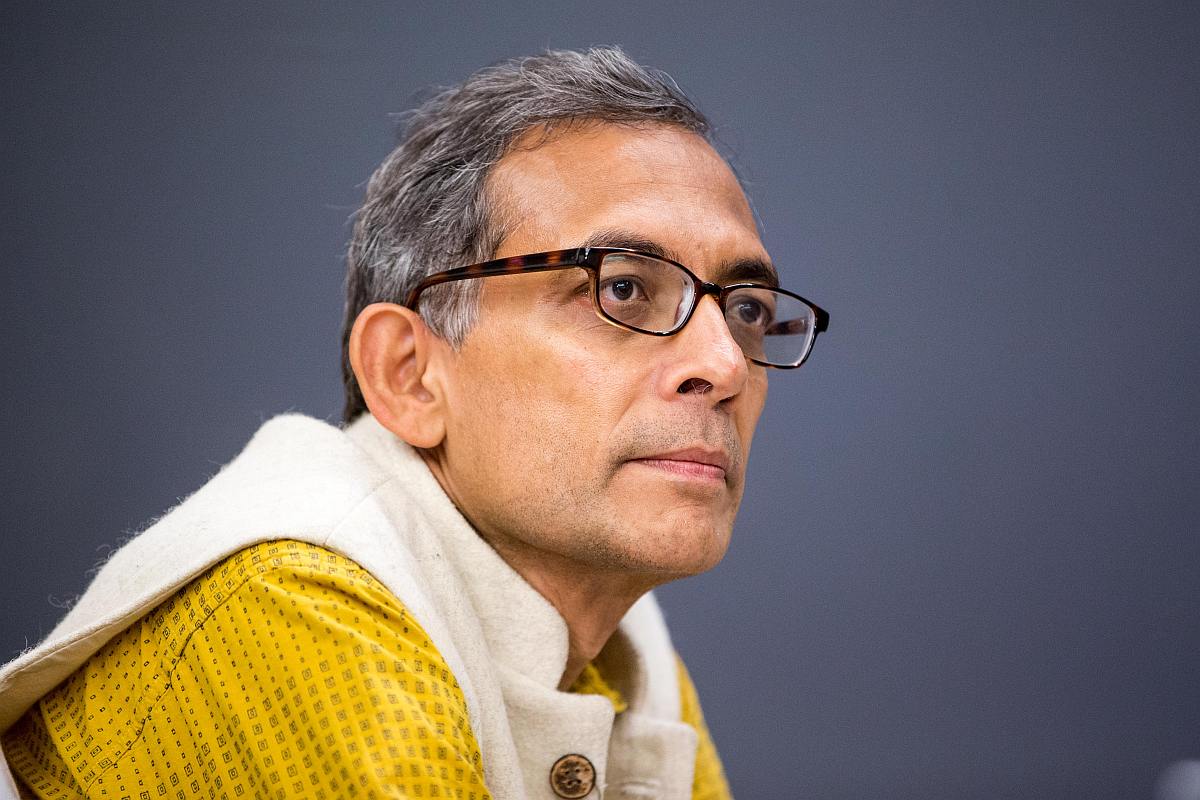Kerala Assembly pays homage to former Dr Manmohan Singh
The Kerala Legislative Assembly on Monday paid tribute to former Prime Minister Dr Manmohan Singh, who passed away on December 26.
Banerjee’s statement on Indian government’s failing financial policies comes after Nobel laureate Amartya Sen, former finance minister Manmohan Singh and former RBI governor Raghuram Rajan advised the Modi administration against some of its drastic decisions like demonetisation and GST.

Abhijit Banerjee, who shares a 2019 Nobel Prize in Economics with Esther Duflo and Michael Kremer, during a press conference at Massachusetts Institute of Technology on October 14, 2019 in Cambridge, Massachusetts (Photo: Scott Eisen/Getty Images/AFP)
Indian-American economist Abhijit Banerjee, who jointly won the 2019 Nobel Economics Prize with his wife Esther Duflo and Harvard’s Michael Kremer, on Monday pointed out the failing Indian economy and said it is “doing very badly” even as the government is increasingly recognising that there is a problem.
“The economy is doing very badly in my view,” he told a press conference at the Massachusetts Institute of Technology after wining the prize.When asked about his opinion on the state of the economy in India and its future, he said, “That’s a statement not about what will work in the future but about what’s going on now. That I’m entitled to have an opinion about.”
Advertisement
Referring to the numbers put out by the National Sample Survey, that come out every 1.5 years and give estimates about the average consumption in urban and rural areas in India, Banerjee said, “the fact that we see in that is that between 2014-15 and 2017-18, that number has slightly gone down. And that’s the first time such a thing has happened in many many many many many years so that’s a very glaring warning sign.”
Advertisement
“There is enormous fight going on in India about which data is right and the government has a particular view of (that) all data that is inconvenient to it is wrong. But nonetheless, I think that this is something that I think even the government is increasingly recognising that there is a problem. So the economy slowing very very fast. How fast we don’t know, there is this dispute about data but I think fast,” he said.
Banerjee added that he does not know exactly what to do. “The government has a large deficit but right now it’s sort of at least aiming to please everybody by pretending to hold to some budgetary targets and monetary targets,” he said. He said that in his view when the economy is going into a “tailspin”, is the time when “you don’t worry so much about monetary stability and you worry a little bit more about demand. I think demand is a huge problem right now in economy.”
Banerjee’s statement on Indian government’s failing financial policies comes after Nobel laureate Amartya Sen, former finance minister Manmohan Singh and former RBI governor Raghuram Rajan advised the Modi administration against some of its drastic decisions like demonetisation and GST.
Last year, Sen had criticised the government saying the country has taken “quantum jump in the wrong direction” since 2014. “Things have gone pretty badly wrong… It has taken a quantum jump in the wrong direction since 2014. We are getting backwards in the fastest-growing economy,” Sen said.
Former PM Manmohan Singh last month had advised the government over falling GDP rate and said “all-round mismanagement” by the Modi government was responsible for the slowdown. “The state of the economy today is deeply worrying. The last quarter’s GDP growth rate of 5 per cent signals that we are in the midst of a prolonged slowdown. India has the potential to grow at a much faster rate but all-round mismanagement by the Modi government has resulted in this slow down,” he said in a statement.
Singh said the country’s youth, farmers and farm workers, entrepreneurs and the marginalised sections deserve better. India cannot afford to continue down this path, he said, adding, “I urge the government to put aside vendetta politics, and reach out to all sane voices and thinking minds, to steer our economy out of this man-made crisis.”
Former Reserve Bank of India governor Raghuram Rajan who was also part of OP Jindal Lectures at Brown University along with Banerjee had on multiple occasions called out the government for its financial policies. In one of his LinkedIn post, which came in the backdrop of the Modi government removing Rathin Roy and Shamika Ravi from the Economic Advisory Council to the Prime Minister allegedly because they were critical of the government’s policies, he said “…an attempt to impose a uniform majoritarian culture on everyone can kill minority community characteristics that can be very advantageous to growth and development. Cultural diversity can promote intellectual diversity and intellectual ferment, something every economy at the frontier needs.”
Finance Minister Nirmala Sitharaman last week in Mumbai evaded a direct reply to a question on whether the government accepts there is an economic slowdown, and said the government is giving relief to all sectors who need help.
Advertisement